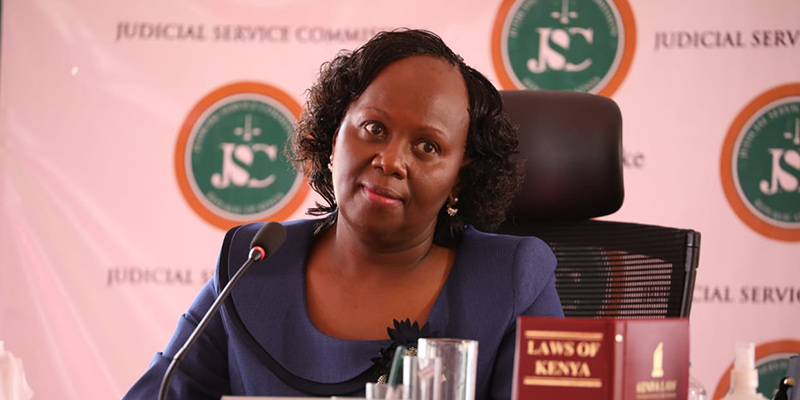Last year Patricia Kameri-Mbote, 59, came within sniffing distance of becoming vice-chancellor of the University of Nairobi when she was ranked third in interviews. High-octane political intrigues and cases in court ultimately decided the appointee.
Back in 2019, Kameri-Mbote became only the sixth person — and the only woman — to earn a higher doctorate degree in law from the University of Nairobi.
During her public lecture at the University of Nairobi in 2019, she gave a glimpse of her disillusionment with the law and why she was attracted to multi-disciplinary study: “I realized that the law I had learnt was sanitized, blind and abstracted from my lived realities. Nothing I was taught related to my multiple identities as a woman, a mother, a daughter, a sister.”
The thrust of her thesis, a 179-page tome on “Contending Norms in A Plural Legal System: The Limits of Formal Law”, she lays out the new normal where people and societies respond to formal law through resistance, defiance, innovation and non-adherence.
“Formal law’s claims of clarity, coherence, objectivity and stability are misleading,” she told the university congregation, adding that the Building Bridges Initiative was one such an example this emergent practice. The BBI initiative, she argued, is the product of a handshake between bitter presidential election contenders, where the winner and loser agreed to work together and initiated a conversation. Their conversation resulted in a Constitution Amendment Bill. “That an initiative of two people can catalyse review of a constitution that emerged from broad-based consultations over a long period of time is evidence of formal law’s powerlessness in the face of informal initiatives pushed by powerful individuals.”
Kameri-Mbote’s academic footprint is spread over several respected journals across Africa, Europe and the United States, that have published her 30-odd articles. Over the years, she has whipped together intellectuals to produce authoritative titles on environmental law, property, wildlife, gender, science and technology and has written a book, Kenya Land Governance Assessment Framework, as well as co-authored a Kenya Justice Sector and Rule of Law review.
Kameri-Mbote’s teaching experience stretches beyond Nairobi to the University of Kansas, University of Stellenbosch in Cape Town, and the University of Zimbabwe.
After admission to the roll of advocates in 1989, Kameri-Mbote was drawn to the academy, teaching at University of Nairobi’s School of Law from 1990, with study breaks to undertake a diploma in women’s law at the University of Zimbabwe in 1995, a Master’s degree in law in development at Warwick in 1990, a Master of Juridical Sciences from Stanford University in 1996 and a Doctor of Science in Law from the same university in 1999.
Over the years, Kameri-Mbote has climbed the academic ranks, rising from assistant lecturer to lecturer to senior lecturer in 15 years, before becoming associate professor for six years and professor for 10 years. She chaired the Department of Private Law from 2002 before taking three years’ unpaid leave to establish the Strathmore University’s School of Law in 2008. Kameri-Mbote returned to the University of Nairobi to serve as dean at the School of Law between 2013 and 2016.
Since graduating with a law degree from the University of Nairobi in 1987, Kameri-Mbote has spent her life blazing the trail in establishing the connection between women, land and the environment, as well as science and technology.
Yet, Kameri-Mbote’s sojourn in the ivory tower has not disconnected her from everyday life. After the government lost the 2005 referendum on the draft constitution she was appointed to the 15-member Committee of Eminent Persons the following year to advise the government on how to revive the stalled process. Kameri-Mbote has also served on the Water Services Regulatory Board, the Lewa Wildlife Conservancy board, the Kenya Copyright Board, the Advocates Coalition for Development and Environment (ACODE-Uganda) and the Kenya Land Conservation Trust.
Kameri-Mbote was a policy scholar at the Woodrow Wilson International Center and served on the boards of the Global Council of the Water and Sanitation Program, the International Development Law Organization, and the Pell Centre for International Relations, Salve Regina University, Rhode Island.
One of the sample writings Kameri-Mbote has supplied to the Judicial Service Commission for consideration in her application for the position of Chief Justice proposes the use of drone technology to improve Kenya’s land management information systems.
Kameri-Mbote was appointed Senior Counsel in 2012, and was later elected to the Senior Bar Committee, a position that has since put her in conflict with the leadership of the Law Society of Kenya over a putative list of new Senior Counsel appointed last year. Although her membership of the committee was settled through mediation as ending in March next year, LSK president Nelson Havi has used the controversy as evidence of Kameri-Mbote’s lack of suitability to serve in judicial office.
Integrity is the centrepiece of Kameri-Mbote’s higher doctorate thesis, which brings all her research into one body. In it, she argues that the tension between formal law – in constitutions and statutes – and informal law, consisting of customary norms, often produces a struggle between legality and legitimacy. She demonstrates that in many instances, science and technology run ahead of existing law and create norms as has been evident in Kenya’s experience around mobile money, biotechnology research around genetically modified organisms and the use of drones. She proposes the use of the provisions on the integrity chapter in Kenya’s Constitution as a standard for restoring balance in a society riven by the dichotomy between legality and legitimacy. She proposes that instead of relying on mere legality and legitimacy, a new standard based on humanness, wholeness and Ubuntu should be adopted to resolve tensions between formal and informal law.
On 27 November 2019, Kameri-Mbote gave a 13-minute uninterrupted breakdown of the BBI report at the Bomas of Kenya, which largely resonated with the legal philosophy she had presented in her public lecture for her higher doctorate.
Although Kameri-Mbote towers over the other applicants because of her academic pedigree, her lack of bench experience in the Judiciary, as well as anxieties about gender and regional balance could complicate her ascendancy to the Chief Justice’s position. It has been argued that since there is a woman Deputy Chief Justice, it would not be fair to appoint a woman as Chief Justice. Kameri-Mbote will walk into the interview room in her own right as an intellectual with something to contribute to the institution, which would also counter anxieties about her being born in Murang’a and being an additional Kikuyu in a court where the community is already represented.
–
Back to: Kenya Chooses Its Next Chief Justice







